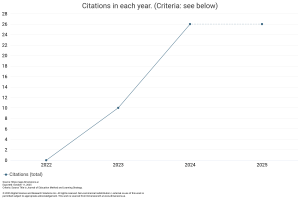The Influence of Entrepreneurial Knowledge on Entrepreneurial Interest in the Fashion Sector in Phase F Students of the Fashion Design and Production Program of SMKN 2 Lamongan
DOI:
https://doi.org/10.59653/jemls.v3i02.1531Keywords:
Knowledge, entrepreneurial knowledge, Interest in learning, entrepreneurshipAbstract
This study aims to: 1) Describe the level of entrepreneurial knowledge of students, 2) Describe the level of entrepreneurial interest of students, 3) Describe the influence of entrepreneurial knowledge on students' entrepreneurial interest. This study is quantitative research with an expost facto design. The population in the study is all students of the fashion design and production expertise program at SMKN 2 Lamongan. The sampling technique used was purposive sampling with a sample of 51 students. Data collection techniques are in the form of documentation and questionnaires. The data analysis technique uses simple linear regression analysis. The study results showed that 1) Students' knowledge level reached the highest level of 50% in the range of 90-100 scores, and students were declared complete. 2) The entrepreneurial interest of students in the very good category reaches 40.4%. Still, the entrepreneurial interest of students in the low and low category is also quite large, namely 40% with 22 students. 3) Entrepreneurial knowledge had no effect on entrepreneurial interest with a significance of 0.299>0.05 and a determination value (R2) of 0.22% and 99.78% influenced by other factors.
Downloads
References
Aziz, H. A., Efendi, A., & Basori. (2019). The influence of technology based learning facilities to student learning achievement. Journal of Informatics and Vocational Education, 2(1).
Dwiyanti, S., Hafizah, & Aulia Arif, N. (2023). Pengaruh sikap mandiri, motivasi, pengetahuan kewirausahaan terhadap minat berwirausaha (studi kasus UMKM muda yang baru memulai usaha di Kelurahan Kota Matsum II, Medan bidang kuliner). Jurnal Ekonomi Bisnis Digital, 2(2), 281–299. https://doi.org/1047709/jebidi.v2i2.296.
Giri, S., & Nyoman, S. (2023). Pengaruh pengetahuan kewirausahaan dan media sosial terhadap minat berwirausaha mahasiswa Fakultas Ekonomi Universitas Pendidikan Ganesha. Jurnal Pendidikan Ekonomi Undiksha, 15(1). https://ejournal.undiksha.ac.id/index.php/JPE/article/view/63546/27152
Hendrawan, J. S. (2017). Pengaruh sikap mandiri, motivasi, pengetahuan kewirausahaan terhadap minat berwirausaha. Asian Journal of Innovation and Entrepreneurship, 2(3).
Iswandari, A. (2013). Pengaruh motivasi intrinsik, pengetahuan kewirausahaan, dan kepribadian terhadap minat berwirausaha pada siswa SMKN 12 Surabaya. Jurnal Ekonomi Pendidikan dan Kewirausahaan, 1(2), 152–162. https://journal.unesa.ac.id/index.php/jepk/article/view/705
Jacobson, J., & Harrison, B. (2022). Sustainable fashion social media influencers and content creation calibration. International Journal of Advertising, 41(1). https://doi.org/10.1080/02650487.2021.2000125
Jamaluddin, R., Ali, M. H., Kadir, S. A., & Kamis, A. (2019). Impact of fashion entrepreneurship programme on entrepreneurial interests, intention and competencies. Journal of Technical Education and Training, 11(1). https://doi.org/10.30880/jtet.2019.11.01.015
Musthofa, M. A., & Muhson, A. (2014). Pengaruh pengetahuan kewirausahaan, self efficacy, dan karakter wirausaha terhadap minat berwirausaha pada siswa kelas XI SMK Negeri 1 Depok Kabupaten Sleman. Jurnal Pendidikan dan Pembelajaran, 3(2), 123–135. https://eprints.uny.ac.id/16081/1/
Noviantoro, G. (2018). Pengaruh pengetahuan kewirausahaan, motivasi berwirausaha, dan lingkungan keluarga terhadap minat berwirausaha pada mahasiswa Akuntansi FE UNY. Jurnal Protfita: Kajian Ilmu Akuntansi, 6(1). https://journal.student.uny.ac.id/profita/article/view/13764
Nurfendah, Y., & Wagiran, D. (2020). Factors of Interest in Fashion Entrepreneurship on Students of Vocational School Fashion Design. International Journal of Management and Humanities, 4(10). https://doi.org/10.35940/ijmh.j0955.0641020
Oktaviani, V., & Yulastri, A. (2020). THE EFFECT OF LEARNING OUTCOMES ON SUBJECT OF CREATIVE PRODUCT AND ENTREPRENEURSHIP, FAMILY SUPPORT TO ENTREPRENEURIAL INTEREST IN STUDENTS OF FASHION MANAGEMENT SMKN 6 PADANG. JURNAL PENDIDIKAN TEKNOLOGI KEJURUAN, 3(2). https://doi.org/10.24036/jptk.v3i2.223
Paramitasari, F., & Muhyadi. (2016). Pengaruh motivasi berwirausaha dan pengetahuan kewirausahaan terhadap minat berwirausaha siswa kelas XI kompetensi keahlian administrasi perkantoran SMKN 1 Bantul. Jurnal Pendidikan Administrasi Perkantoran-S1, 5(3), 239–248. https://eprints.uny.ac.id/32262/1/
Rahmania, M., Efendi, Z., & Si, M. (2016). Pengaruh pengetahuan kewirausahaan dan penggunaan sosial media terhadap kewirausahaan mahasiswa. Jurnal Pengembangan Wiraswasta, 20(3), 203. https://doi.org/10.33370/jpw.v20i3.246.
Shanty, N. L. A., & Subroto, T. W. (2023). Pengaruh pengetahuan kewirausahaan, motivasi berwirausaha dan lingkungan keluarga terhadap minat berwirausaha mahasiswa. Journal of Management and Business (JOMB), 5(2), 81–83. https://doi.org/10.31539/jomb.v5i2.8183
Sitompul, P., Silalahi, D., Kornet, M., Nauli, K., & Sinambela. (2022). Pengaruh pemberian mata kuliah kewirausahaan terhadap minat mahasiswa berwirausaha. Jurnal KUKIMA (Kumpulan Karya Ilmiah Manajemen), 3(2), 2829–0941. https://ejournal.ust.ac.id/index.php/KUKIMA/article/view/4215/3129
Sugiyono. (2019). Metode penelitian kuantitatif, kualitatif dan R&D. Alfa Beta.
Wahyuningsih, S. E., Sawitri, S., Sholikah, R., & Wulandari, D. (2019). The level of necessity and mental readiness by fashion department students in supporting fashion business incubator. International Journal of Innovation, Creativity and Change, 9(5). https://doi.org/10.2991/assehr.k.191217.049
Yang, J., & Yoo, J.-J. (2023). Investigation of Fashion Students’ Interest in Fashion Entrepreneurship. International Journal of Costume and Fashion, 23(2). https://doi.org/10.7233/ijcf.2023.23.2.016
Downloads
Published
How to Cite
Issue
Section
License
Copyright (c) 2025 Mar'atul Aziza, Mita Yuniati, Lutfiyah Hidayati, Deny Arifiana

This work is licensed under a Creative Commons Attribution-ShareAlike 4.0 International License.
Authors who publish with this journal agree to the following terms:
- Authors retain copyright and grant the journal right of first publication with the work simultaneously licensed under a Creative Commons Attribution-ShareAlike that allows others to share the work with an acknowledgement of the work's authorship and initial publication in this journal.
- Authors are able to enter into separate, additional contractual arrangements for the non-exclusive distribution of the journal's published version of the work (e.g., post it to an institutional repository or publish it in a book), with an acknowledgement of its initial publication in this journal.
- Authors are permitted and encouraged to post their work online (e.g., in institutional repositories or on their website) prior to and during the submission process, as it can lead to productive exchanges, as well as earlier and greater citation of published work (See The Effect of Open Access).
























